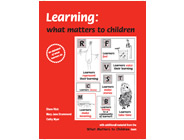-
Some training of practitioners by nurture group staff
already goes on in Xxxxxxxx LEA’s nurture group schools. Further organised
training services require a full time nurture group liaison officer/co-ordinator.
-
Routes for funding the training service require full
exploration and schools needs support in how to access all of these
routes.
-
The staff development opportunities nurture groups can
offer all Xxxxxxxx LEA staff should outweigh anxieties. ‘Reaching the
many’ should be an ideal which can be aspired to. If nurturing principles
are important for all children, all schools and early years services in
Xxxxxxxx LEA should be entitled to access the expertise offered through
this unique provision.
-
Fostering links with initial training organisations and
associations using quality assurance schemes (eg NDNA, PLA) could be
beneficial to all practitioners setting out on their initial stages of
working with children and ensure that nurturing principles are understood
by a much wider audience.
-
A full time nurture group officer/co-ordinator should be
employed to link with, support and monitor all of Xxxxxxxx LEA’s nurture
groups, liaise with all support agencies, support new groups and undertake
relevant nurture group duties.
-
Initial training for work in nurture groups is varied and
often does not exist for either nurture group staff or other staff in
schools.
-
Nurture group staff, once in post, have a good training
programme, which they want maintained. They highly value the Wednesday
monthly training sessions and regard the inset provided as ‘relevant’ and
‘excellent’.
-
There is currently very limited use of Xxxxxxxx LEA’s
nurture group schools to mentor new staff from within the borough. Many
staff in Xxxxxxxx LEA know little or nothing about its nurture groups.
-
Whole school approaches to nurture groups make a
difference to: the success of the group; staff morale, professional
development for all staff; a nurturing ethos throughout the school.
-
Staff in school value support from top level. It is
essential that headteachers support and understand the principles of
nurture groups. Initial and ongoing training and support for headteachers
should be considered.
-
Headteachers value support from top LEA level. Staff at
top LEA level should attend and support the termly steering group
meetings, which were once thought of as a source for peer support and
professional development for headteachers. This would reinstate the status
of the meetings; ensure that it is able to act as an effective self
monitoring service; and help to ensure that it is supported by all
headteachers.
-
Nurture groups are a potential schools source of training
for Xxxxxxxx LEA schools and early years setting school across the borough
of Xxxxxxxx LEA and beyond its boundaries.
-
Nurture group staff in Xxxxxxxx LEA contribute towards
the development of nurture groups at national level through: presenting
sessions on accredited courses, hosting out of borough visitors, links
with the national nurture group network, being nationally acknowledged in
publications, studies, radio and TV broadcasts. They support national
initiatives through good practice.
-
The Operational Guidelines are interpreted with some
flexibility. It is important to agree when a nurture group might cease to
be a nurture group.
-
However a Xxxxxxxx LEA nurture group school has
interpreted the Operational Guidelines, nurturing principles underpin
provision.
-
However a school interprets the Operational Guidelines,
parents are highly supportive of the school’s nurture group provision and
identify numerous benefits for their children.
-
Monitoring and supporting nurture groups to ensure
practice is developed well, requires ongoing, consistent support from a
permanent member of staff within the LEA with responsibility of nurture
groups in Xxxxxxxx LEA - new and old.
-
The approaching anniversary year of Xxxxxxxx LEA’s
nurture group provision, in 2005, should be celebrated by raising the
profile of the existing nurture groups and extending nurture group
services.

